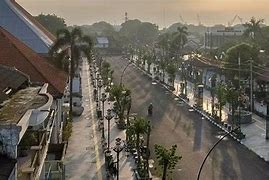
RADEN AJENG KARTINI PELOPOR EMANSIPASI WANITA
Raden Ajeng Kartini atau yang lebih dikenal sebagai RA Kartini adalah seorang pahlawan nasional Indonesia yang dikenal sebagai pelopor emansipasi wanita. Lahir pada tanggal 21 April 1879 di Jepara, Jawa Tengah, RA Kartini merupakan putri dari keluarga bangsawan Jawa yang cukup terkenal. Sebagai seorang wanita yang lahir pada masa penjajahan Belanda di Indonesia, RA Kartini mengalami keterbatasan dalam memperoleh pendidikan dan kesempatan untuk berkembang. Namun, RA Kartini tidak menyerah dan tetap berjuang untuk mendapatkan pendidikan serta memperjuangkan hak-hak wanita.
Sejak kecil, RA Kartini telah menunjukkan minat yang besar dalam bidang pendidikan. Ia belajar bahasa Belanda dari seorang guru swasta dan membaca banyak buku, termasuk buku-buku yang ditulis oleh para feminis Belanda. Dari situlah, Kartini mulai memiliki pandangan yang lebih luas tentang peran wanita dan hak-haknya. Pada usia 12 tahun, RA Kartini dijodohkan oleh keluarganya untuk dinikahkan dengan seorang bangsawan Jawa yang lebih tua darinya. Namun, RA Kartini menolak perjodohan tersebut dan meminta izin untuk melanjutkan pendidikannya di sekolah Belanda. Meskipun awalnya ia ditentang oleh keluarganya, akhirnya Kartini berhasil meyakinkan ayahnya untuk memberinya izin.
Setelah menyelesaikan pendidikan di sekolah Belanda, RA Kartini bekerja sebagai guru di sekolah pribumi. Di sana, ia berjuang untuk memperjuangkan hak-hak pendidikan bagi wanita Indonesia. Ia juga membuka sekolah untuk perempuan, yang dikenal sebagai Sekolah Kartini, di mana ia mengajarkan bahasa Belanda, seni dan kerajinan, serta keterampilan lainnya.Tulisan-tulisannya yang dipublikasikan di surat kabar dan buku-buku yang ia tulis memperjuangkan hak-hak wanita dan kesetaraan gender. Buku "Habis Gelap Terbitlah Terang" merupakan salah satu karya Kartini yang terkenal, di mana ia menuliskan pemikirannya tentang pendidikan dan emansipasi wanita.
RA Kartini meninggal dunia pada usia yang sangat muda, yaitu 25 tahun, akibat komplikasi persalinan. Namun, perjuangannya untuk memperjuangkan hak-hak wanita dan kesetaraan gender telah memberikan pengaruh yang besar bagi Indonesia dan dunia internasional. Pada tanggal 21 April, Indonesia merayakan hari Kartini, sebagai penghormatan dan apresiasi atas perjuangan RA Kartini. Hari Kartini juga dijadikan sebagai momen refleksi dan inspirasi bagi semua orang, khususnya bagi wanita Indonesia, untuk mengembangkan potensi diri dan memperjuangkan hak-hak yang sama dengan laki-laki.
Ada beberapa pelajaran penting yang dapat dipetik dari perjuangan dan karya RA Kartini, di antaranya:
Dalam rangka menghormati jasa-jasa RA Kartini, setiap tanggal 21 April di Indonesia diperingati sebagai Hari Kartini. Peringatan ini menjadi momentum untuk mengenang dan mempelajari kembali perjuangan serta karya RA Kartini, serta memperkuat semangat untuk terus memperjuangkan kesetaraan gender dan kebebasan individu.
Sumber Gambar Dari Google.Penulis: Lusia Rahajeng
Educated at Dutch Schools
As a child, Kartini was very active, playing and climbing trees. She earned the nickname "little bird" because of her constant flitting around. A man of some modern attitudes, her father allowed her to attend Dutch elementary school along with her brothers. The Dutch had colonized Java and established schools open only to Europeans and to sons of wealthy Javanese. Due to the advantages of her birth and her intellectual inclination, Kartini became one of the first native women allowed to learn to read and write in Dutch.
Despite her father's permission to allow her a primary education, by Islamic custom and a Javanese tradition known as pingit, all girls, including Kartini, were forced to leave school at age 12 and stay home to learn homemaking skills. At this point, Kartini would have to wait for a man to ask for her hand in marriage. Even her status among the upper class could not save her from this tradition of discrimination against women; marriage was expected of her. For Kartini, the only escape from this traditional mode of life was to become an independent woman.
Wrote Letters to Holland
From 1900 to 1904 Kartini stayed home from school in according to the dictates of Javanese tradition; she found an outlet for her beliefs in letters she wrote in Dutch and sent to her friends in Holland. Kartini was unique in that she was a woman who was able to write; what set her apart even further was her rebellious spirit and her determination to air concerns that no one, not even men, were publicly discussing.
Kartini wrote to her European friends about many subjects, including the plight of the Javanese citizenry and the need to improve their lot through education and progress. She recounts how Javanese intellectuals were put in their place if they dared to speak Dutch or to protest. She also describes the restrictive world she lived in, rife with hierarchy and isolationism. In 1902 Kartini wrote to one letter, to Mrs. Ovink-Soer, that she hoped to continue her education in Holland so that she could prepare for a future in which she could make such education accessible to all women.
Kartini is most known for writing letters in which she advocates the need to address women's rights and status, and to loosen the oppressive Islamic traditions that allowed discrimination against women. She protests against education restricted to males of the nobility, believing that all Javanese, male and female, rich and poor, have the right to be educated in order to choose their own destiny. Women especially are not allowed to realize their calling. As Nursyahbani Katjasungkana commented in the Jakarta Post, "Kartini knew and expounded the concept that women can make choices in any aspect of their lives, careers, and personal matters."
Opened School for Girls
Rather than remaining submissive and compliant, like a good Javanese daughter, the unconventional Kartini often had disagreements with her father, and it is believed that her family was, consequently, eager to marry her off. On November 8, 1903, she obeyed her father and married Raden Adipati Joyoadiningrat, the regent of Rembang. Joyoadiningrat was a wealthy man of age 50 who already had three wives and a dozen children. Kartini—who was, at 24 years of age, considered too old to marry well—found herself a victim of polygamy. She was devastated by the marriage, which ended her dream of studying abroad just as she was awarded a scholarship to study in Europe.
Despite the marriage, in 1903 Kartini was able to take a first step toward achieving women's equality by opening a school for girls. With aid from the Dutch government Kartini established the first primary school in Indonesia especially for native girls regardless of their social standing. The small school, which was located inside her father's house, taught children and young women to read and make handicrafts, dispensed Western-style education, and provided moral instruction. At this time, Kartini also published the paper "Teach the Javanese."
Kartini's enthusiasm at educating Indonesian girls was short lived. On September 17, 1904, at the age of 25, she died while giving birth to her son. Kartini is buried near a mosque in Mantingan, south of Rembang.
Promoted Nationalist Movement
Fearful of losing control over their island territory, the Dutch colonialists believed that knowledge of European languages and education could a be dangerous tool in the hands of the native Javanese. Consequently, they suppressed the activities of the native people, keeping them as peasants and plantation laborers, while at the same time counting on the Javanese nobility to support them in their rule over the region. Only a few of the nobility, Kartini's father included, were taught the Dutch language. Kartini believed that once the Europeans introduced Western culture to the island, they had no right to limit the desire of native Javanese to learn more. Clearly, by the late nineteenth century there was talk of independence. With her letters and her egalitarian fervor, Kartini can be said to have started the modern Indonesian nationalist movement.
Kartini was not proud of being set apart from her countrymen as one of the privileged few of the aristocracy. In her writings she described two types of nobility, one of mind and one of deed. Simply being born from a noble line does not make one great; a person needs to do great deeds for humanity to be considered noble.
Akhir Hayat Raden Ajeng Kartini
Lanjutkan membaca artikel di bawah
Mengutip e-book Sisi Lain Kartini oleh Prof. Dr. Djoko Marihandono, dkk, tiga hari setelah pernikahannya, Kartini pindah ke Rembang untuk memulai hidup baru sebagai seorang ibu. Ia harus membagi waktu untuk suami dan anak-anaknya. Keluarga Bupati Rembang akan berkumpul kembali pada jam empat, dengan aktivitas yang berbeda.
Aktivitas keseharian Kartini mulai terhambat setelah mengandung anak pertamanya. Kondisi fisiknya mulai menurun sehingga beberapa kali menderita sakit. Tanggal 13 September 1903, Kartini melahirkan seorang anak laki-laki dengan selamat. Setelah melahirkan kondisi Kartini tampak sehat dan berseri-seri, karena itu dokter yang membantu persalinan kembali ke kotanya.
Tanpa sebab yang jelas kondisi tubuh Kartini melemah. Dokter tidak bisa mengembalikan kesehatan tubuhnya. Pada 17 September 1903, akhirnya Kartini wafat dalam usia yang masih sangat muda 25 tahun. Kematian R.A. Kartini pun sangat mengguncang pikiran suaminya.
Letters Ultimately Published
Kartini's legacy is found in the many letters she wrote to friends in Holland. In 1911 a collection of her Dutch letters was published posthumously, first in Java and then in Holland as Door Duisternis tot Licht: Gedachten Over en Voor Het Javanese Volk ("From Darkness to Light: Thoughts about and on Behalf of the Javanese People"). The book was then translated into several languages, including French, Arabic, and Russian, and in 1920 was translated by Agnes Louis Symmers into English as Letters of a Javanese Princess. In 1922 Armijn Pane finally translated the book into the Javanese language under the title Habis Gelap Terbitlah Terang ("After Darkness, Light Is Born"), which he based on a verse found in both the Bible and the Qur'an in which God calls people out of the darkness and into the light. More recently, Kartini's granddaughter, Professor Haryati Soebadio, re-translated the letters and published them as Dari Gelap Menuju Cahaya, meaning "From Darkness into Light."
Kartini's letters spurred her nation's enthusiasm for nationalism and garnered sympathy abroad for the plight of Javanese women. Syrian writer Aleyech Thouk translated From Darkness into Light into Arabic for use in her country, and in her native Java Kartini's writings were used by a group trying to gain support for the country's Ethical Policy movement, which had been losing popularity. Many of Kartini's admirers established a string of "Kartini schools" across the island of Java, the schools funded through private contributions.
Kartini's beliefs and letters inspired many women and effected actual change in her native Java. Taking their example, women from other islands in the archipelago, such as Sumatra, also were inspired to push for change in their regions. The 1945 Constitution establishing the Republic of Indonesia guaranteed women the same rights as men in the areas of education, voting rights, and economy. Today, women are welcome at all levels of education and have a broad choice of careers. Kartini's contributions to Indonesian society are remembered in her hometown of Jepara at the Museum Kartini di Jepara and in Rembang, where she spent her brief married life, at the Museum Kartini di Rembang.
Pemikiran Raden Ajeng Kartini
Mengutip artikel Sejarah R.A.Kartini oleh Universitas Pakuan, pahlawan nasional tersebut banyak menulis surat-surat yang berisi pemikiran-pemikirannya tentang kondisi sosial saat itu,terutama tentang kondisi perempuan pribumi. Sebagian besar suratnya berisi keluhan dan gugatan khususnya menyangkut budaya di Jawa yang dipandang sebagai penghambat kemajuan perempuan.
Dia ingin perempuan memiliki kebebasan menuntut ilmu dan belajar. Kartini menulis ide dan cita-citanya, seperti yang tertulis dalam Zelf-ontwikkeling dan Zelf-onderricht,
Zelf-vertrouwen dan Zelf-werkzaamheid dan juga Solidariteit. Semua itu atas dasar Religieusiteit, Wijsheid en Schoonheid (yaitu Ketuhanan, Kebijaksanaan dan Keindahan), ditambah dengan Humanitarianisme (peri kemanusiaan) dan Nasionalisme (cinta tanah air).
Surat-surat Kartini juga berisi harapannya untuk memperoleh pertolongan dari luar. Kartini mengungkap keinginan untuk menjadi seperti kaum muda Eropa. Ia menggambarkan penderitaan perempuan Jawa akibat kungkungan adat, yaitu tidak bisa bebas duduk di bangku sekolah, harus dipingit, dinikahkan dengan laki-laki yang tak dikenal, dan harus bersedia dimadu.
Surat-surat Kartini banyak mengungkap tentang kendala-kendala yang harus dihadapi ketika bercita-cita menjadi perempuan Jawa yang lebih maju. Meski memiliki seorang ayah yang tergolong maju karena telah menyekolahkan anak-anak perempuannya meski hanya sampai umur 12 tahun, tetap saja pintu untuk ke sana tertutup.
Kartini sangat mencintai sang ayah, namun ternyata cinta kasih terhadap sang ayah tersebut juga pada akhirnya menjadi kendala besar dalam mewujudkan cita-cita. Sang ayah dalam surat juga diungkapkan begitu mengasihi Kartini. Ia disebutkan akhirnya mengizinkan Kartini untuk belajar menjadi guru di Betawi, meski sebelumnya tak mengizinkan Kartini untuk melanjutkan studi ke Belanda ataupun untuk masuk sekolah kedokteran di Betawi.
Keinginan Kartini untuk melanjutkan studi, terutama ke Eropa, memang terungkap dalam surat-suratnya. Beberapa sahabat penanya mendukung dan berupaya mewujudkan keinginan Kartini tersebut. Ketika akhirnya Kartini membatalkan keinginan yang hampir terwujud itu, terungkap adanya kekecewaan dari sahabat-sahabat penanya.
Itulah tadi informasi penting tentang Raden Ajeng Kartini yang perlu kamu tahu. Tentu warisan semangat pahlawan nasional ini harus diteruskan oleh generasi sekarang.
Baca Juga: 10 Poster Hari Kartini 2024, Menginspirasi dan Menarik!
FOCUS June 2009 Volume 56
Raden Ajeng Kartini (1879-1904) is credited with starting the move for women's emancipation in Java, an island then controlled by Holland as part of the Netherlands Indies (now Indonesia). Born to the aristocracy, Kartini was privileged to be able to attend Dutch colonial schools, but was forced to quit at an early age due to Islamic law at the time. At the age of 24, she was married to a man twice her age who already had three wives. Kartini wrote letters to her friends in Holland protesting the treatment of women in Java, the practice of polygamy, and of the Dutch suppression of the island's native population. Decades later, the Indonesian state constitution promised gender equality to all its citizens, and Kartini Day continues to be celebrated on April 21 to commemorate Kartini's contribution to women's rights.
Kartini was born on April 21, 1879, in Mayong village near of Jepara, a town located in the center of the island of Java. She was born into the Javanese priyayi, or aristocracy; her father was Jepara mayor Raden Mas Adipati Ario Sosroningrat. Kartini was one of 12 children born to Raden's several wives.



